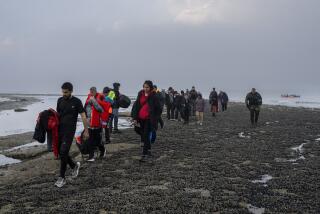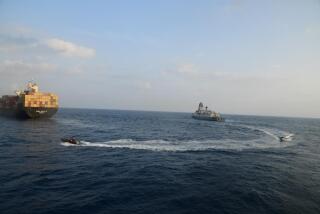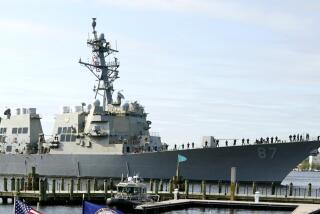Marines Boarding Ships Lower Boom on Iraq Smugglers
UMM AL QASR, Iraq â The smugglers prefer the night. They slip through the darkness on foot and in trucks with dimmed headlights, making their way to the Shatt al Arab waterway to negotiate the sale of their booty: crude oil and copper bars.
Somewhere out in the night, among the wrecks of ships and abandoned fishing boats, await the captains of barges and, farther out, in the Persian Gulf, the officers of foreign tankers.
For the buyers, the risks are substantial but the potential rewards large. Deals are struck in U.S. dollars, and soon the illegal oil is transferred to vessels that are swallowed up by the blackness as they head for distant ports.
The British, who lead a 10-country division policing southeastern Iraq, say that every night until recently, 2,000 tons of crude oil -- enough to fill 65 tanker trucks -- plus a bonanza in copper stripped from electrical cables have been smuggled out of Iraq.
Each transaction, they say, represents a kind of national thievery that is an obstacle to reconstruction, in effect a theft from Iraqâs treasury. U.S. military officials have estimated that the smuggling of petroleum products alone costs the nation $200,000 a day. And each deal weakens public confidence in the U.S.-led coalition forcesâ ability to provide security and reduce lawlessness.
Two weeks ago, the game rules changed. The 13th Marine Expeditionary Unit, based at Camp Pendleton, disembarked from the amphibious assault ship Peleliu with high-speed, inflatable Zodiac boats and launched Operation Sweeney to disrupt the smuggling. The ongoing operation is one of the largest undertaken since Saddam Husseinâs regime fell in April.
Capt. Christian Rankin, commander of the 1st Battalionâs Bravo Company, clambered aboard one of four Zodiacs on a recent morning and sped out of the port of Umm al Qasr at 30 knots. Upriver was the Richa, a rusting tanker from Bombay. The jet-black Zodiacs, loaded with heavily armed Marines, circled it like a flock of vultures. A few crewmen stood on deck, watching impassively, and the captain peered down from the balcony of his cabin.
Rankin requested permission to board, and in a few minutes the Marines were climbing up a rope ladder dropped by the crew. The Richa, it turned out, was âcleanâ -- the captainâs documents were in order, the cargo legal -- and the vessel was allowed to continue its journey on one of the regionâs busiest shipping lanes.
But the U.S.-led coalition, which is now trying to query or board every passing ship in Iraqi waters, has found dozens of suspected smugglers.
Working on land and water, the Marines and their British partners have arrested 75 people and taken over 36 tanker trucks and 35 barges. A school bus they stopped was loaded with 55-gallon drums of oil.
Frequently, those arrested had broken into pipelines using sledgehammers or bullets, filling their containers from the leaks, authorities said. Others have cut down utility poles to loot copper from the wires. They then melt the metal into bars.
On Oct. 9, British Marines, with support from the U.S. Coast Guard, seized the Guinean-flagged Marvan as it emerged from the Iraqi port of Abu Flus with 1,800 tons of allegedly stolen oil. The case has not yet made its way very far into the newly reestablished Iraqi judicial system.
âThe smuggling problem is large-scale and widespread,â British Maj. Gordon Mackenzie said. âIt involves both individuals trying to make quick money and organized criminals. Its roots go back to the former regime, and the variety of methods Saddam Hussein used to avoid U.N. sanctions, which, in effect, institutionalized smuggling.â
Hussein commissioned official smugglers, who used the small port of Khor Zubair, northeast of Umm al Qasr, to circumvent the sanctions. The oil passed through Iranian waters, where Iranian officials collected a fee for every barrel, and ended up on the open market, from Malaysia to Russia. Freelancers caught smuggling oil were executed by Husseinâs regime.
Although interdiction patrols have operated in Iraqi waters since the British captured Umm al Qasr in March, the intensified anti-smuggling campaign did not begin until after the Navstar, a tanker flying the Panamanian flag, was caught in August trying to smuggle more than 3,800 tons of oil out of Iraq.
Last week, an Iraqi tribunal sentenced the Ukrainian captain and his assistant to seven years in prison and fined them $2.4 million. They had pleaded not guilty, saying they were operating under orders of the Navstarâs owner, whom they identified as a Dubai, United Arab Emirates-based Iraqi.
The Navstarâs crew of 21 has been detained.
The case was the first of its kind since Hussein was overthrown.
In August, the U.S.-led occupation administration decided that the Iraqi judiciary was free to investigate and decide the fate of about 20 ships held upriver from Umm al Qasr.
Within 48 hours, a judge had boarded the ships and ruled there were grounds to hold six of them.
In recent days, the amount of contraband seized by coalition forces has declined. âWeâve cut down on a lot of illegal activity,â U.S. Marine Capt. Bill Pelletier said.
âThe fact we havenât seized much in the last few days is a measure of our success. Word is getting around.â
More to Read
Sign up for Essential California
The most important California stories and recommendations in your inbox every morning.
You may occasionally receive promotional content from the Los Angeles Times.










